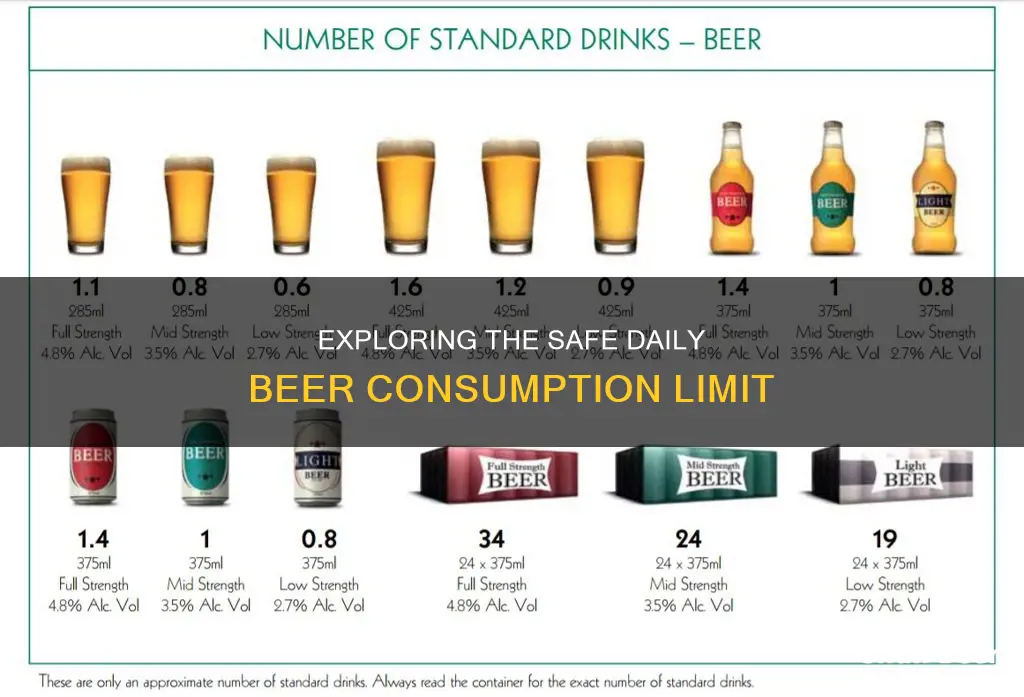
Drinking beer is a popular pastime for many, but how much is too much? The answer varies from person to person, and factors such as frequency, amount, and individual health come into play. While occasional or moderate drinking is not typically a health issue, heavy and binge drinking can lead to serious health problems and increase the risk of issues such as unintentional injuries, violence, memory problems, dementia, organ damage, heart disease, stroke, cancer, and depression. So, how many beers should one drink per day? The general guideline is one to two beers per day, with excessive drinking defined as more than four beers for women and more than five beers for men in a typical two-hour binge drinking session. However, it's important to note that drinking any amount of alcohol can have negative consequences, and it's always advisable to consume alcohol in moderation or not at all if there are health concerns.
What You'll Learn

Health benefits of drinking beer
Drinking beer in moderation may have several health benefits. Firstly, beer may contribute to our daily nutrient intake. Beer contains more protein and B vitamins than wine, and is also a source of phosphorus, folate, niacin, fibre, and silicon. Silicon, in particular, is an essential mineral for bone formation and may help prevent osteoporosis. Beer may also lower your risk of diabetes. A study published in the journal of the European Association for the Study of Diabetes found that men who drank between one and six beers per week had a 21% lower risk of diabetes.
Beer may also benefit your heart. A study presented at the American Heart Association Scientific Sessions in 2016 followed 80,000 participants for six years and found that moderate drinkers had the slowest decline in high-density lipoprotein (HDL), or "good" cholesterol, and a lower risk of cardiovascular diseases. Beer may also aid in building stronger bones. A review published in the International Journal of Endocrinology found that moderate beer consumption increased bone density in men.
Additionally, beer may lower the risk of dementia. Moderate alcohol intake has been associated with a reduced risk of dementia, while heavy drinking can increase this risk. Beer may also have anti-inflammatory properties due to the hops it contains, which is an essential ingredient in beer. Lastly, moderate beer consumption may also help control blood sugar levels, which is an issue for many adults.
Ethanol Distillation Simplified: Beer Stripper Method
You may want to see also

Excessive drinking
The impact of excessive drinking goes beyond physical health. It can lead to social and family problems, affect your productivity at work, and cause financial issues. It can also shorten your lifespan. According to a study in Denmark, Finland, and Sweden, people with alcohol use disorder (AUD) had a life expectancy that was 24-28 years shorter than that of the general population.
If you're concerned about your drinking habits or think you might have a problem with alcohol, it's important to seek help. Talk to your doctor, therapist, or an addiction specialist, and look into support groups or treatment programs.
Drinking Beer and Driving in Mexico: What's Allowed?
You may want to see also

Binge drinking
The short-term effects of binge drinking include poor motor control, slower reaction times, and a shorter attention span. Additionally, binge drinking during pregnancy can lead to fetal alcohol spectrum disorders. Over time, binge drinking can cause mental health problems, loss of brain volume, a weakened immune system, and an increased risk of certain cancers. It is also associated with a higher risk of developing an alcohol use disorder.
To prevent binge drinking, it is recommended to limit alcohol consumption to no more than one drink per day for women and two drinks per day for men. It is also important to consume alcohol with food and to alternate alcoholic drinks with non-alcoholic ones, preferably water.
Beer and Diabetes: What Diabetics Need to Know
You may want to see also

Alcohol dependence
The signs of alcohol dependence include:
- Needing to consume more alcohol to achieve the desired effect, indicating an increased tolerance.
- Spending most of one's time thinking about alcohol or engaging in activities to obtain, consume, or recover from its effects.
- Experiencing physical withdrawal symptoms, such as shaking, sweating, or nausea, when blood alcohol levels drop or when trying to reduce or stop drinking.
- Feeling a strong need to drink, getting into trouble due to drinking, and having others express concern about one's drinking habits.
- Giving up important activities, hobbies, or social engagements due to alcohol.
- Continuing to drink despite the harm it causes to one's health, relationships, or personal life.
To reduce the risk of alcohol dependence, it is recommended to take regular breaks from drinking and to limit alcohol consumption to no more than 14 units per week, with at least three alcohol-free days each week.
Beer and Antibiotics: Is it Safe to Drink with Amoxi Clav?
You may want to see also

Health issues from drinking beer
Beer is a popular alcoholic beverage that has been consumed for thousands of years. While drinking one or two standard beers per day may have some health benefits, excessive beer consumption can lead to various health issues. Here are some of the health issues associated with drinking too much beer:
Increased Risk of Chronic Diseases:
Excessive beer consumption is linked to an increased risk of developing chronic diseases. According to the Centers for Disease Control and Prevention, heavy drinking can lead to high blood pressure, stroke, heart failure, and cardiomyopathy. Additionally, drinking alcohol is a risk factor for certain types of cancer, including mouth, throat, esophageal, liver, and breast cancer. The American Cancer Society estimates that alcohol consumption accounts for 6% of all cancers and 4% of cancer deaths in the United States.
Weight Gain and Obesity:
Beer is known for its high-calorie content, with a standard 12-ounce beer containing around 153 calories. Consuming multiple drinks can contribute to weight gain and increase the risk of obesity.
Liver Disease:
Heavy beer drinking can lead to liver diseases such as cirrhosis, which is characterized by scarring of the liver. Drinking more than two to three 12-ounce beers daily can significantly raise the risk of liver disease.
Depression and Mental Health Issues:
Excessive beer consumption is associated with an increased risk of depression. Research suggests that heavy and binge drinkers have a significantly higher risk of developing depression compared to moderate drinkers and non-drinkers.
Digestive Issues and Gut Health:
Beer can cause digestive issues such as abdominal pain, bloating, and diarrhea. Alcohol irritates the small intestine and colon and can affect the normal speed of food movement through the gastrointestinal tract. Additionally, excessive alcohol consumption can negatively alter gut bacteria and contribute to intestinal inflammation and alcoholic fatty liver disease.
Disrupted Sleep:
Alcohol consumption, even in light amounts, can impair sleep quality. The liver's process of metabolizing alcohol can disrupt sleep patterns, resulting in a fitful night of sleep.
Malnourishment and Vitamin Deficiency:
Heavy beer drinking can lead to malnourishment and vitamin deficiencies. The body prioritizes the breakdown and elimination of alcohol, which can interfere with the absorption and utilization of essential nutrients.
Early and Permanent Dementia:
Excessive and long-term beer consumption can increase the risk of early and permanent dementia. The alcohol in beer can affect the brain, slowing down reflexes and impairing memory and cognitive functions.
Unintentional Injuries and Violence:
Drinking too much beer can increase the risk of unintentional injuries, such as car crashes, and contribute to violent behaviors, including domestic violence, sexual assault, and homicide.
Higher Risk of Death:
Heavy and binge drinking are associated with a higher risk of early death. Worldwide, alcohol misuse is the fifth-leading risk factor for disability and premature death. Excessive alcohol use can lead to a significant reduction in life expectancy.
Tramadol and Non-Alcoholic Beer: Safe Mix or Not?
You may want to see also
Frequently asked questions
Drinking one or two standard beers per day may have positive effects for your heart, bones, blood sugars, and dementia risk. However, drinking more than that on a regular basis can put you at risk and often reverse any health benefits of drinking beer.
Moderate drinking for women is defined as one drink a day. Drinking more than that on a regular basis can put you at risk and often reverse any health benefits of drinking beer.
Drinking too much beer can increase your risk of many serious health issues, including unintentional injuries, violence, risky sexual behaviours, memory and learning problems, early and permanent dementia, liver disease, heart disease, stroke, high blood pressure, cancer, depression and anxiety.
In moderation, drinking beer may offer some health benefits, including lowering your risk of diabetes, a decreased risk of heart disease, increased bone density in men, and a lowered risk of Alzheimer's and dementia.







